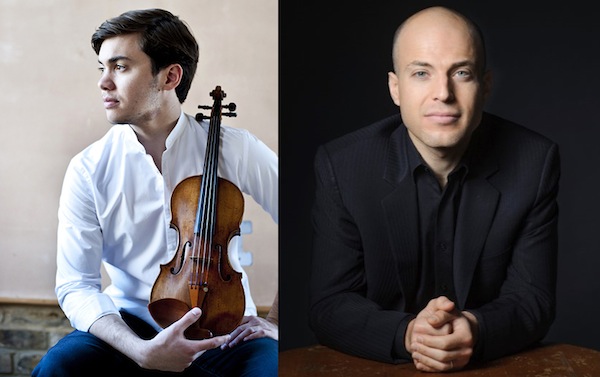With a storm outside, Beilman and Weiss provide musical sustenance

Violinist Benjamin Beilman and pianist Orion Weiss performed a recital Wednesday night at PIckman Hall for the Celebrity Series.
Benjamin Beilman’s Celebrity Series debut Wednesday night at Pickman Hall proved to be an evening of the unexpected.
First was the weather. Boston’s second Nor’easter in a week was projected to dump up to ten inches of snow in the area. Fortunately, the storm held off until later in the evening, making the commute to the concert relatuvely safe.
Beilman’s program diverted from his originally scheduled selection, and the audience was treated to music by Mozart, Beethoven, and Fritz Kreisler instead of Bartók. The New England premiere of Frederic Rzewski’s Demons, though, went on as planned.
The 28-year-old violinist is rapidly rising into the front ranks of soloists on the scene today. He plays with sterling technique and a kaleidoscopic sound that recalls that of his teacher, Christian Tetzlaff. His timbre shifts colors on a dime: sunlit phrases turn dark and then silvery within a single passage.
In Rzewski’s Demons, those colors drive the music forward. Like much of the American composer’s music, this four-movement sonata involves a political theme. Moved by the speaking of activist Angela Davis, the work’s dedicatee, and by the results of the 2016 presidential election, Rzewski explores in music what he sees as the irrationality that drives much political thinking. “I am not religious, and I don’t know much about devils and such,” the composer said in his program note, “but as an artist I cannot help feeling sensitive to whatever it is that awakens these ideas in humans, causing them to go crazy.”
Demons draws upon political songs for its sources. The second movement muses upon the spiritual “Freedom is a Constant Struggle,” a song well known during the Civil Rights era, which unfolds through haunting passages for both violin and piano.
But aside from its political message, Demons is a work of stunning power and simplicity. In its 30-minute length, the music traverses from agitated statements that would sound at home in Steve Reich’s music to passages of sparse dissonance. Ever the experimental composer, Rzewski even calls for the pianist to dampen and pluck the strings for halo effects and metallic sonorities. Once-popular styles shade the work as well. The pianist called upon to unleash torrents of jazzy riffs in the final movement while the violinist performs the languid parts of the score with bluesy slides.
Demons, written for Beilman, resulted in a searching and driving showpiece for both violinist and pianist. Beilman handled Rzewski’s pointillisms and aggressive passagework with intensity and grace. Pianist Orion Weiss proved a sensitive partner here and throughout the evening, playing with crystalline technique and pearly tone. Both made a strong case for Rzewski’s work, and one hopes it will go on to have many performances.
The opener was Mozart’s Violin Sonata in A major, K. 526. A dance-like elegance swept through this music from the outset, with Beilman and Weiss shaping their phrases with singing tone at a swift tempo. Beilman’s dusky sonorities tipped the hymn-like phrases of the second movement towards darkness. The finale was muscular and sounded with almost Beethovenian weight. Weiss was in command here, his running lines sounding with power, urgency, and crispness that enabled each note to come off with a ping.
In Beethoven’s Violin Sonata No. 10 in G major, Beilman and Weiss found an avuncular warmth of tone and texture. The violinist’s buttery sound transformed into rosy shades as the first movement progressed. Weiss’s trills at movement’s end added an almost pastoral glow.
The Scherzo had a bright, cutting edge to the sound, with Beilman’s line taking on the verve of a country fiddler. Both musicians handled Beethoven’s wide shifts of mood in the finale with dexterity and a touch of humor.
The beating heart of the work is the second movement, one of the most beautiful in Beethoven’s violin sonatas. There, Beilman spun the arching melody through soft, radiant phrases. Weiss supplied chords that were felt more than heard.
Kreisler’s Viennese Rhapsodic Fantasietta, which concluded the program, was a real treat, as Beilman and Weiss delivered a sweltering performance of its grand waltzes. Beilman’s tone gleamed, and both musicians seemed to lead the other with tasteful rubato shading. As each phrase bounded with a delightful skip, one realized that both Beilman and Weiss are two musicians who can find interpretative depths even in the flashiest of pieces.
The snow, which started falling once the concert began, didn’t keep the duo from offering encores. “Blues” from Ravel’s Violin Sonata, had the swagger of a Gershwin song. The second, Kreisler’s Liebesleid, returned the players to the lush, honey-toned sound worlds they explored throughout the evening.
The next classical music event sponsored by the Celebrity Series will feature the Takács Quartet in music by Mozart, Beethoven, and Shostakovich 8 p.m. March 23 at Jordan Hall. celebrityseries.org; 617-482-6661
Posted in Performances




